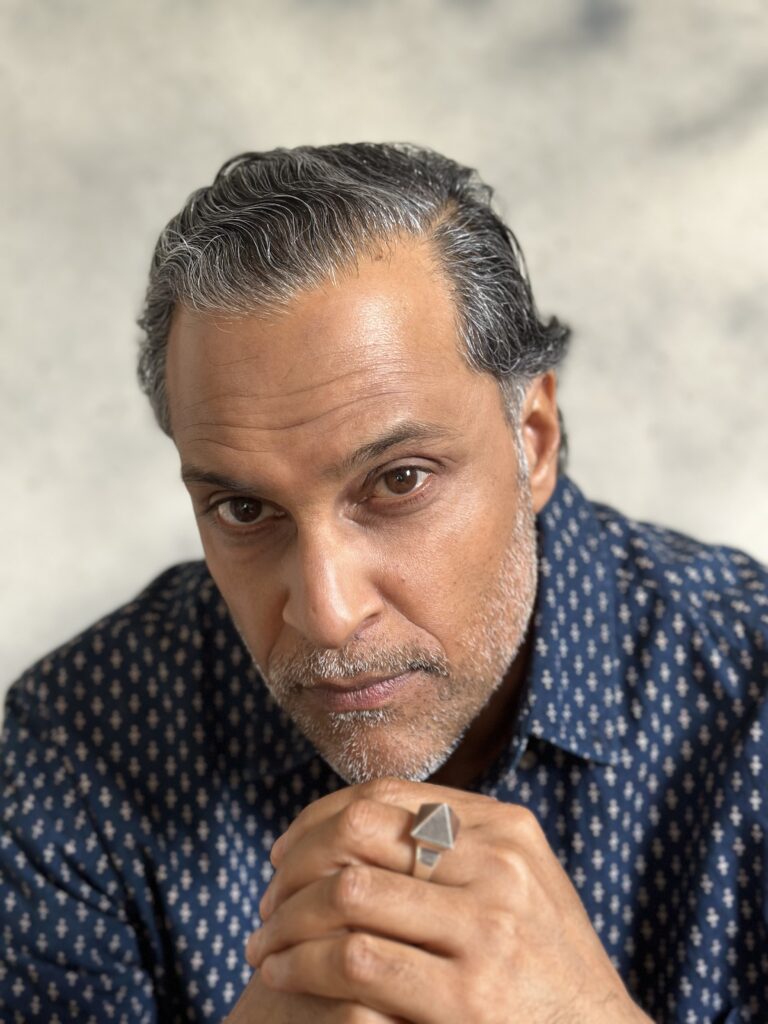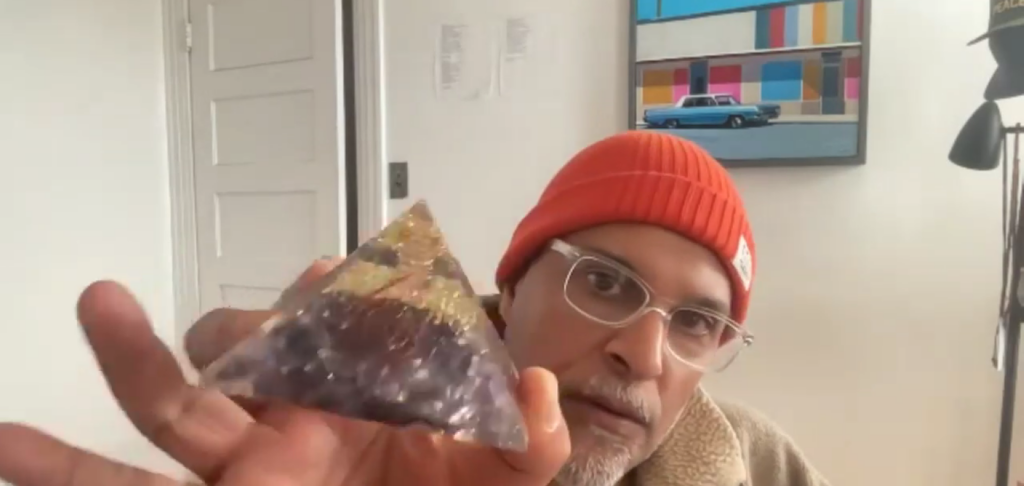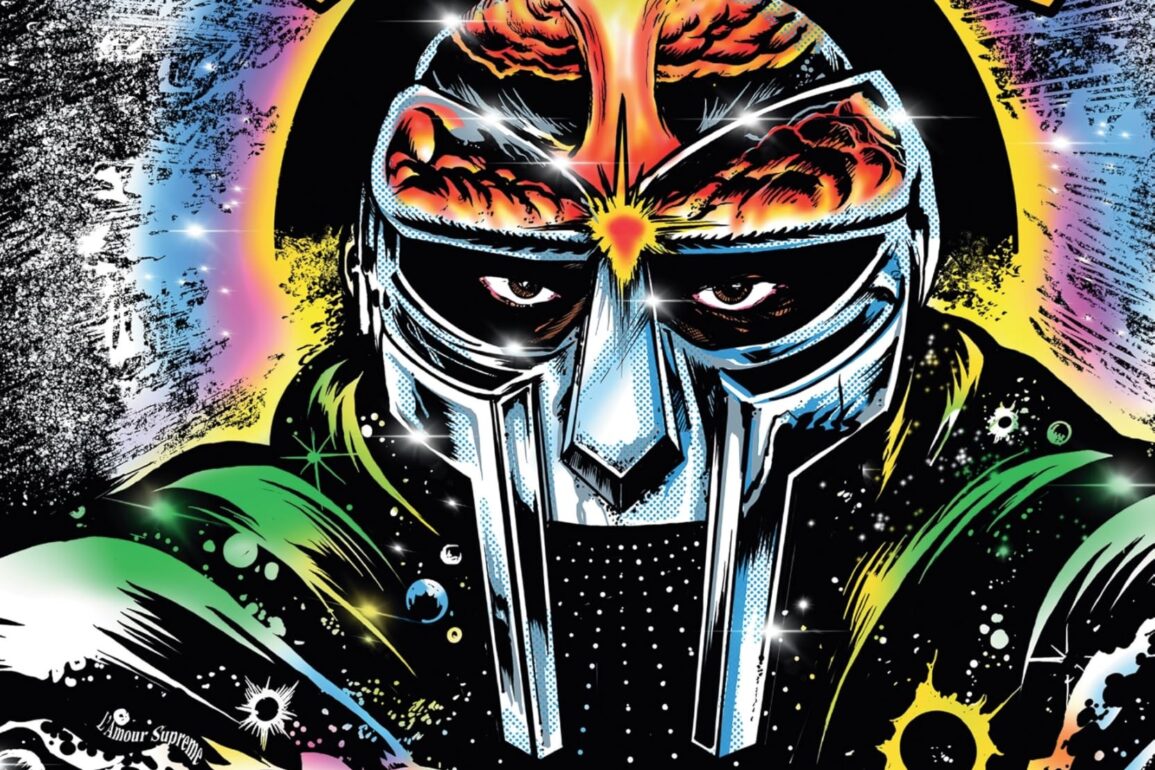Record producer, rapper, music journalist, label owner, chef. Sarath “SKIZ” Fernando Jr has written a biography on rap’s masked figure, MF Doom. Chronicles of Doom: Unravelling Rap’s Masked Iconoclast is out now. We talked to SKIZ himself to have a chat on the late legend, only to embark on an interview as enigmatic and unpredictable as Doom himself.

I want to start by asking you two questions: How did you first get to know MF Doom on a personal level during his KMD era? And how did you first realize that you needed to write this book?
SKIZ: I used to freelance for a lot of music publications in the 90s, including The Source Magazine, which was a big hip hop magazine. So I was a fan of KMD and I was very surprised that the second album, Black Bastards, never came out because of the controversial cover art. After that I kind of lost track of Doom, who was until then known as Zev Love X, because he went underground. Then he reemerged four or five years later as MF Doom. I didn’t even know that was the same guy. I didn’t know that MF Doom was Daniel Dumile. My friend Prince Paul told me, “Hey, that’s Zev Love X from KMD!” So I was like, “Wow.” I became an MF Doom fan.
I followed his career in the early 2000s when he was putting out so many records. And then, just like everyone else, I was shocked when I heard at the end of 2020 that he had died and his death had not been announced for two months. You know, there’s a lot of mystery around Doom. So immediately in 2021, I started researching Doom and I found out, “Wow, this guy had an incredible life and he was an incredible artist.” I had no idea about half the stuff he had done. I had just finished writing my book on Wu Tang Clan, From the Streets of Shaolin, and I was looking for a new project. So I was like, “Wow, if anyone deserves a book, it’s Doom.” Even though he was so underground, he has had such a huge impact on hip hop that he deserved to be known. So that’s the long and the short story of how I ended up doing the book.
When you think of it, the idea of someone disappearing for a few years only to come back under a new moniker without anyone realizing that’s the same guy seems so absurd right now. You wouldn’t easily get a comic book-like arc in the internet age where everyone is much more visible. So I guess that whole fanzine and cassette era where Doom emerged added to the guy’s mythos, right?
Oh, yeah, of course. As you said, his life is almost like a comic book character. That’s why in the book I actually told the whole origin story of Dr. Doom, which is the character he’s based on, just to show you that there’s so many parallels between his own life, the life of Daniel Dumile, and this character that he was inhabiting, Doom, and I think it was so clever the way that he borrowed this concept, even the whole concept of the super villain. Yes, he calls himself a villain, he’s not necessarily a bad guy, because as Doom said, the definition of a super villain here is a killer who loves children, equally skilled at destruction as well as building. To me, that’s the genius of Doom. He was this character which you couldn’t tell was a good guy or a bad guy. And he really played that up. He did a lot of mischievous things, he did a lot of cool things. And that was part of the myth that he created. That’s another genius move, because no one in hip hop had really done that before. Comic books are a big influence on hip hop, right? And you have a lot of rappers who try to take the names of comic book characters, but Doom is a guy who really lived that persona. He really brought that persona to life. Not only that persona, but he was able to inhabit so many other different characters too.
Let’s dwell a bit more into the comic book part. Doom was a big nerd of comics. And I say nerd in a way that signifies utter love and respect. Back in the 90s, though, being a nerd was culturally ridiculed, and you would become an outcast in society if you displayed yourself as a nerd. Times have changed. Today we see comic book and fantasy literature adaptations in mainstream media, they are witnessing their most popular period ever. What do you think Doom would feel -or had felt towards the end of his life- about this rise in nerd culture popularity?
Well, he was always into comics and not just comics, cartoons too. He had a real passion for animation in general, whether it’s a comic book or an animated TV show. And I think that’s really what he brought into hip hop, because as you said, the term nerd had a kind of negative connotation beforehand. I think Doom kind of made it cool to be a nerd. He brought in a whole new audience into hip hop, which was the nerds, you know? Hip hop before that had always been very macho posturing, even sometimes misogynistic against women. Doom was one of those artists that showed that you didn’t have to come at hip hop from that direction. He kind of opened it up and said, “Look, there’s, there’s all this other stuff going on too. Comic books and cartoons are just as valuable.”
He not only sampled vocal snippets from cartoons, but also a lot of music from cartoons. I go into that in the book, I break down a lot of instances where he sampled the music from Scooby Doo or Spiderman cartoons. That was a sample source that hip hop producers hadn’t really tapped into before, or maybe just a little bit. Maybe Prince Paul had sampled some. But Doom went full force for it. That was part of his creativity. He wanted to do something that no one was doing. He was really into that stuff as a kid too. So he grew up with that foundation and basically, he made other people appreciate that too. For example, the album The Mouse and The Mask was mostly Adult Swim cartoons. I didn’t have cable, so I had never seen any of that stuff. So he introduced me to all those Adult Swim cartoons, which are really cartoons for adults. Even though cartoons are meant for kids, these have humor on an adult level. Kudos to Doom for doing that, for bringing this influence.
He could not have seen that superhero movies would become popular, because initially, he would just steal artwork from Marvel and use it as a record cover, and Marvel Comics would issue a cease and desist. You’re not allowed to do that now. Last year, Marvel actually came out with a comic book where they pay homage to Doom, which is incredible for this established giant of a company, Marvel, that’s making all these million dollar movies and stuff, to now come back and make a homage to Doom. I guess you heard about this: for the film The Gladiator II, they made a popcorn bucket with the gladiator mask design. That was also another homage to Doom, because Doom used that mask. It’s incredible that this guy who was never on a major label has had this impact on popular culture now. And that just goes to show that it was his talent that really attracted people.
When we put Doom in a context like this, it really goes to show how much of an effect on culture he really had. When I interviewed Xiu Xiu’s Jamie Stewart years ago, he said to me: “When I was a kid, no jock would listen to The Cure, ever. Or no white kid would listen to hip-hop. Now everybody listens to everything.” That has to do with the wonders of the Internet age mainly, and I think MF Doom has a large impact on this age that we are living in.
Yeah, and the Internet had a huge impact on Doom too. I don’t think he would have had the same impact without the Internet. It opens up his audience when you can buy stuff on the Internet, when you can download stuff, you know? You don’t need the physical product in the stores. Another way that the Internet really affected Doom is observable with the Madvillainy album. The whole album was leaked on the Internet, and Doom and everyone who was making the album thought that would kill the record, that since people can get it for free on the Internet, no one would get it right. But what that incident was really showing was how the Internet can be used to promote something, to hype something up. Because what they did was they went back and Doom re-recorded all the vocals and they did put the physical album out, and that became his most popular release, because after it leaked on the Internet, everyone was super hyped about it. That’s one of the first examples of viral marketing, even though it wasn’t meant to be like that. It was actually a mistake that the album was leaked and it was not going to be a good thing, but it turned out to be a positive thing for Doom and for that album. So yeah, definitely the Internet. I don’t think he could have done it himself, especially coming from all these independent labels. The Internet really equaled the playing field a lot between the major labels and independent labels. Doom was the beneficiary of that, because most of the albums that he put out were on different independent labels.
As part of your research preparing the book, you did lots of interviews with people who were close to Doom. You mention that among the people you contacted, some people accepted your offer to talk and some did not. From those you talked to, was there any information that came to you that really shifted the narrative of Doom in your mind?
I would say about 50% of the book is open source research, from YouTube and stuff like that. Obviously all the Dooms interviews are included in that. But I also interviewed about 50 people across the spectrum from family members to people he collaborated with to people who ran the labels to engineers. So I got a good cross section of people who knew the guy. Doom has this mystique about him, so really everything I found out about was kind of a revelation, because no one knew anything about him.
Probably his younger brother Dimbaza gave me the most information about Doom personally. He filled in a lot of the blanks of that missing chunk of time between ‘94 when he lost his record deal and ‘99 when he came back on the independent label. So he was a huge resource. I would say Tom Brown from Lex Records was also a huge resource, because he told me about Doom’s time in London, which not many people knew about. So having known nothing about Doom before coming into this book, everything I found out was pretty incredible. Most of it is in the book.
I’m more interested in Doom’s artistry than his personal life and stuff like that. That’s why the music section of the book is probably the biggest section of the book, where I go into all the albums. But I did find out a lot about Doom, about his personal life and stuff. I didn’t really want to talk about his family life and his kids. That was, to me, kind of off limits just to respect his privacy, because knowing that he’s a private guy, that was a tough thing to do in this book, you know? To respect his privacy and to gather what to reveal, because as far as I’m concerned, everything is on a need to know basis. I would just say that as much as I revealed about Doom, I think that his mystique is still intact, because there’s so much that you don’t know about him, too. And like I said in the beginning of the book, you can’t get into the guy’s head because he’s not here to talk to anymore, he took a lot of secrets with him, you know? He doesn’t even talk about himself in his lyrics too much. Very rarely does he put personal information there.
I love the theatrical value in music, and Doom gives that a lot, not only in his image, but also the music itself through his skits. From a personal point of view, do you have a favorite skit that you keep coming back to?
You know, at first I thought, “This guy has way too many skits!” (laughs) I thought they were slowing down the momentum of the album. But as you listen to it more, you come to appreciate it, and what you come to appreciate is the amount of detail he puts into it, because he’s basically telling the backstory of his character. To me, all the skits are relevant. It’s just sometimes, especially on MM..Food, there’s a huge chunk of skits in the middle of the record, and it just slows the whole momentum of the album, you know? Only Doom would do something like that where he wants you to listen to all this and really get it down. After you listen to it time and time again, you almost memorize the skits.
I don’t have a favorite skit, but I would just say that it’s all comic relief. If you’re not into it, you can always fast forward. But I urge people to listen to those skits, because Doom doesn’t do anything without a reason. You’re going to glean some knowledge from those skits either about Doom or what he’s doing, his whole concept. I don’t think anyone has more humorous skits than Doom. Even though he didn’t invent the skit. I would say someone like Prince Paul or Dr. Dre were the first to put so many skits on an album. But Doom really became the skit master. It’s almost like stand up comedy in between songs to me. So you can take it or leave it, but I think most of it is good stuff.
Whenever I hear his skits, I envision Doom as a guy who really likes to have fun through the process. He puts in a lot of effort, but also has enormous fun during that.
Of course. He’s taking from all types of sources and he doesn’t even know where it’s gonna go himself until it’s almost actually done. So that’s another aspect of Doom’s creativity: This kind of collage art of the skits.
Collage is a good word to describe the production method of Doom’s art. His lyrics, his beats are so full of different ideas and he just melts them together.
I think that’s true with everything you could look at. With the samples he chooses or his lyrics, that’s just his way. In the book, I wrote about how he writes stuff on little post-it notes with just two lines and he just sticks them on the wall. Then when he’s trying to come up with the rhyme, he might choose two, three or four post-it notes and make it work. It’s the same concept as a collage, taking little bits and pieces out of context and putting it together. That was Doom’s process.
A thing that fascinated you during the preparation of this book was Doom’s interest in esoterism and the unknown. Let’s talk about all that as well.
I think that Doom was very much into the esoteric, even more so than people think. It’s a very tough topic to handle. You know how in his lyrics he doesn’t talk about himself personally? Same thing with the esoteric stuff. He doesn’t really put that information explicitly into his lyrics. It somehow shows up. After really studying all his albums, I can see it now. But you really have to dig deep to find all of this esoteric knowledge.
From what I’ve gathered by talking to people who knew him, especially later in his life, he was more interested in hitting YouTube and going down some rabbit hole. I think at a certain point, with all these labels and fans, making music became almost a chore to him. Maybe it wasn’t as fun as it used to be. Maybe now it was more about making money. So I think his escape was the research into all of this wild knowledge. He always had a love for this esotericism since he was a kid. I have a whole chapter on Dr. Malachi York, who’s a big influence on him as far as all these occult knowledge. Just like cartoons and comic books, this was an interest that he had at a young age and it just developed and grew by the time he was a full adult. This is where his mind was at. You could call it new age, you could call it spiritualism, you could call it the occult, but it’s just hidden knowledge.
If I could talk to him personally, that’s what I would talk to him about, because I’m interested in stuff like that too. All of that stuff is really becoming bigger now, like the whole UFO issue. I don’t know if it’s big in Turkey now, but in the US, that’s becoming a mainstream issue. There actually was a sighting in Istanbul, a very amazing sighting where the guy filmed the craft and you could actually see people in it. I think that happened in Istanbul in the 90s, or something like that.
I’ve seen several news reports about UFOs in Turkey, but I know those sightings occur a lot more in the US.
You know why? Because of all these military bases with nuclear weapons. That seems to be a common thing: these UFOs can neutralize nuclear weapons. There’s all types of military bases around the US and that’s where a lot of this activity is.
If Doom were right in front of you right now, is there a specific question on esoterism in your mind that you’d really like to ask him?
Oh, wow. That’s tough, man. You’re kind of putting me on the spot. I’m drawing a blank right now. That’s something that I would have to really think about. I’m sorry, I can’t come up with something on the spot.
You know what he was really into, though? You know what this is? This is called an Orgone generator.

I have no idea what that is.
Doom used to make these. You see, it’s got amethyst crystals in it. It’s got other crystals, a copper wire… He was really into this type of stuff. This supposedly enhances your creativity.
Do you know what a geodesic dome is? Have you heard of Buckminster Fuller?
No.
Doom used to build these domes with structures. It’s all about creating energy from the earth. Behind the mask, from the inside, he used to put stuff like this. He was really into third eye activation. He was like some kind of alchemist. That’s really what I would like to talk to him about. Like, where does he get his information from? Where does he see this stuff? Or has he thought of time travel? Dr. Doom used to do that too, right?
I was about to say that all these sound exactly like Dr. Doom.
Yeah, he had a time machine. I would ask Daniel, “Have you ever thought about time travel? Have you ever time traveled?”
It’s sad to a degree that we will never get to ask him these, but it’s good to have imagination.
But he’s out there, you know? Doom always believed that his brother Subroc was with him. Even though the person is not there in the physical, their energy is here.
He really believed in the other side and parallel dimensions and all that type of stuff. And I think all of that is coming up now. That’s knowledge that human beings have forgotten about. We’ve forgotten about where we came from, what we really are. And now in these times, where all of that stuff’s coming back, we’re remembering it. Human beings are realizing that we have much more power then we’re told. You can see it, you can see a huge shift happening. All these governments are crumbling, even though it looks like the right wing is taking over. This is the last gasp of this negative energy that’s had a hold on humanity. You saw the Matrix, right?
Yeah.
It’s really a documentary, you know? The Matrix is a documentary. Now, human beings are finally unplugging and we’re coming into our power. And I think Doom is someone who is on the forefront of that. He tapped into something, because there’s no way that he would be able to have such an impact if he hadn’t. You know what I mean?



